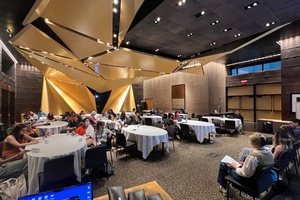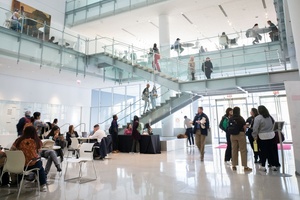Features:
Just One Thing: A Year in Review, Part 3
Appreciation of usefulness and bar-raising at the end of a long, complicated year
As we did last year, we’ve asked a couple of dozen people from all around the news-nerd community to tell us about one thing—article, feature, app, tool, or something else entirely—that they loved in 2015. This week, we’re publishing their responses, from interactives to project management software.
We hope you find here at least one thing that eases your work, inspires new angles on your stories, and helps carry you through to 2016. Read the first and second parts of our community roundup. —ed
Favored Formats
Brian Boyer, NPR
2015 was the year of, for lack of a better name, the sequential visual story: stories in which the visuals drive the narrative, and the user taps, swipes, or clicks to progress. We saw lots this year: Vox doing great stuff on Snapchat Discover, Twitter aggregating moments, our own Look At This stories, and Tampa Bay Times’ epic explainer of how Florida’s schools are failing black students, to name a few.

From Look At This.
Excellent Interactives
Sydette Harry, The Coral Project
The Guardian’s piece on Homan Square. It went from the systemic, to the geographical to the personal , in an incredibly clean and gut-wrenching way. Epidemics of police violence visually became people suffering real consequences. It was a personalization of data rarely seen in reporting.
Daniel Drepper, Correctiv
I loved America’s Most Admired Lawbreaker by Steven Brill for Highline at The Huffington Post. I think we can’t put enough effort into telling great investigative stories about complex issues that affect a lot of people. I loved the attention to detail and read/listened to the whole series.
Dana Amihere, The Dallas Morning News
I love What Are the Fish Telling Us from Fusion Interactive. It’s a really good example of great visual storytelling without a lot of flashiness. Using illustration and color as transitions from one section to the next, the story moves forward in a really aesthetically pleasing way that augments the story rather than overpowering it.
Erika Owens, OpenNews
Lena Groeger’s small multiples piece has really stuck with me, so I loved seeing New York Magazine using it numerous times in print this year. Their 100 women directors piece helped me find more films and TV directed by women. I spent a couple of weeks marveling over their print layout of One Block in Bed-Stuy, and a mini tour of the block over four pages.
Bonus round: Social studies was my favorite subject growing up, so I was humbled and surprised by how much schooling I got from the Struggle and Progress Jacobin issue about Reconstruction after the US Civil War. From economics to the portrayal of Confederate sympathies in film over the past 100 years, and with some striking design (you can buy the cover as a poster), it’s kept me thinking throughout the year.
Lissa Soep, Youth Radio
Here’s a project all of us at YRI shared with the youth team and learned a lot from: The N-Word.

Intriguing Interviews & Explainers
Maite Fernandez, ICFJ
One of my favorite things this year is Paul Ford’s What is Code, published on Bloomberg Businessweek over the summer. It’s a terrific long piece (more than 38,000 words!); it’s not only written beautifully and in simple terms, but it also had all kinds of added features that made it a fun read online.
Linda Sandvik, OpenNews Fellow, The Guardian
This isn’t new as of 2015, but I love Melody Kramer’s ongoing interview series on people not in the news, commenting on the news. An example: Meet Liz. All of them can be found on her GitHub.
Jue Yang, CUNY Graduate School of Journalism
Here’s something great I found in 2015: Partially Derivative.
I stumbled upon this podcast about everything data when I was trying to contextualizing what data journalism is in real newsrooms (episode 35). They reveal data’s ubiquitous existence with diverse topical choices. Looking forward to listening to more of them.

Lovable Tools
Sisi Wei, ProPublica
ArchieML has made translating our apps this year a much easier experience—both for the developers and the translators.
Matt Waite, Drone Journalism Lab/University of Nebraska
I’m really interested in GitBook which uses markdown and Github to publish books. GitBook allows for authors to create ebook versions and even charge for them, or give them away for free. The Tow Center at Columbia is already using it to really great effect, but I’m curious to see if more people inclined to share knowledge and how-to type stuff take it up.
Booster Rockets for Newsroom Culture
Ryan Pitts, OpenNews
Many news organizations worked on diversity as more than an abstract problem. If we want to cover meaningful stories for our communities, and do it well, our newsrooms need to reflect those communities. A few concrete steps from 2015: ProPublica published a “state of the newsroom” report on diversity; Vox Product formalized its inclusivity efforts and published a code of conduct; and the NPR Visuals team changed the way it handles cover letters and interviews to help candidates regardless of background.
Credits
-
 Dana Amihere
Dana Amihere
Dana Amihere is data editor at KPCC, an NPR member station in Southern California. She’s a designer, developer and data journalist who has previously worked for The Dallas Morning News, The Baltimore Sun, and Pew Research Center.
-
 Brian Boyer
Brian Boyer
Brian is an independent consultant. Previously, he was the vice president of product and people at Spirited Media, the visuals editor at NPR, founded the news applications team at the Chicago Tribune, and was a happy intern at ProPublica. He was one of the first programmers to receive a Knight-funded scholarship to study journalism at Northwestern University.
-
Daniel Drepper
editor in chief @BuzzFeedGermany; board member @nrecherche. before: co-founder @correctiv_org; @columbiajourn. PGP: https://t.co/xROphUjRlG
-
Maite Fernandez
Engagement strategist at CQ @RollCall. Formerly @ICFJ, @ijnet, @ObservadorUY. HHDC co-organizer, TLM member. Insta: @maits_ Snaps: @maiteft Tweets in Spanglish.
-
 Sydette Harry
Sydette Harry
Sydette Harry is a child of Far Rockaway. She is a writer and communications critiquer, concerned with communities, sociality and technology, race, gender, and pop culture. Currently Editor of Network at Mozilla.
-
 Erika Owens
Erika Owens
Co-Executive Director of OpenNews.
-
 Ryan Pitts
Ryan Pitts
Ryan Pitts is a developer and journalist in Spokane, WA. He’s the director of network development for OpenNews, a nonprofit organization that helps newsroom developers, designers, and data analysts collaborate on technology and support each other as a community. (OpenNews also publishes this website.) Ryan is a board member and developer at Census Reporter, and was the senior editor for digital media at The Spokesman-Review.
-
Linda Sandvik
Part of the Brexodus. Knight-Mozilla fellow 2015. Wannabe MacGyver. Rebel. ~*creative technologist and coffee enthusiast*~ Works at @NordicApproach
-
Elisabeth Soep
-
 Matt Waite
Matt Waite
Matt Waite is a professor of practice in the College of Journalism and Mass Communications at the University of Nebraska-Lincoln and founder of the Drone Journalism Lab. Since he joined the faculty in 2011, he and his students have used drones to report news in six countries on three continents. From 2007-2011, he was a programmer/journalist for the St. Petersburg Times where he developed the Pulitzer Prize-winning website PolitiFact.
-
 Sisi Wei
Sisi Wei
Sisi Wei is Co-Executive Director of OpenNews, where she envisions and executes transformative initiatives to help create a journalism industry that is more inclusive and equitable, especially for journalists of color and local journalists. Previously, she was the Assistant Managing Editor at ProPublica, during which she edited and managed news apps, graphics, visual investigations and large, interdisciplinary projects. Sisi has won numerous Malofiej, SND Digital and ONA awards, the Gannett Award for Innovation in Watchdog Journalism, and the 2016 Data Journalism Award for Best Individual Portfolio. She has served as an adjunct professor at New York University, The New School and CUNY, and she is also the co-founder of Code with me, a high-impact, nonprofit workshop that teaches journalists how to code. She is based in New York City.
-
Jue Yang
Techno-logist @cunyjschool. Sometimes: @feel_joan, @theatlasreview, @cdjournalism_. Playwright.





